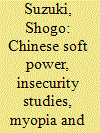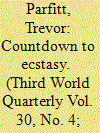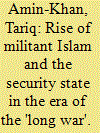|
|
|
Sort Order |
|
|
|
Items / Page
|
|
|
|
|
|
|
| Srl | Item |
| 1 |
ID:
089503


|
|
|
|
|
| Publication |
2009.
|
| Summary/Abstract |
This article aims to provide a review of music sponsorship to market cigarettes in sub-Saharan Africa. Using analysis of previously secret corporate documents from British American Tobacco (bat) and focusing on two separate case studies of sponsorship in Africa, Nigeria and South Africa, the paper illustrates how tobacco companies have sought to undermine health legislation from 1990 to 2001. Both case studies suggest that music is an important marketing tool in Africa because it can effectively target young consumers; has a universal appeal; transcends barriers to communication imposed by limited literacy and language barriers; has a long-term appeal and can be successful in undermining tobacco control measures. The case studies highlight the limitations of national regulatory efforts and reinforce the significance of the implementation of the who's Framework Convention on Tobacco Control in Africa, a critical region for the convention's success.
|
|
|
|
|
|
|
|
|
|
|
|
|
|
|
|
| 2 |
ID:
089508


|
|
|
|
|
| Publication |
2009.
|
| Summary/Abstract |
This article is critical of a series of works on Chinese soft power which have garnered much attention in recent years. These works typically portray Chinese soft power, characterised by its disregard for Western models of development that propagate 'democratic governance', as a latent threat to global order. The article argues that such claims are premature, and to date there is little evidence of a systematic attempt by the Chinese to propagate a 'Beijing model' of autocratic development. These claims are substantiated by analysing China's participation in United Nations peacekeeping operations in Africa, which are characterised by mandates aimed at transforming war-torn states into liberal democracies. I suggest that China's participation in these operations is a crucial component of its 'charm offensive' aimed at the West, and designed to allay fears of a 'China Threat'. The article argues that Chinese understandings of soft power are diverse and directed at multiple audiences. The tendency to 'look for potential threats' in many Western policy-informed works, however, ignores the multifaceted nature and diverse views on Chinese soft power, and clouds our ability to understand this new phenomenon in Chinese foreign policy
|
|
|
|
|
|
|
|
|
|
|
|
|
|
|
|
| 3 |
ID:
089500


|
|
|
|
|
| Publication |
2009.
|
| Summary/Abstract |
This paper examines the antinomies posed by a consideration of development as eschatology. Development is generally conceived as a grand narrative with humanity progressing inevitably to a redemptive goal, whether this be revolution or Rostovian consumerism. It is eschatological in structure. This opens development theory up to critique. Grand narratives premised on an end of history are open to criticism as utopian and exclusory through setting a limit-they conceive of a redemptive ending of time, but repress those excluded from the vision. However, this eschatological structure may also have a function in the shape of the Derridian conception of 'the promise'. This concept refers to a need to posit a closure that incorporates a redemptive, Messianic moment, which impels us to pursue the promise of that moment of development. Thus, the eschatological structure of development incorporates a risk of utopianism/exclusory violence-but we need the Messianic moment in order to conceptualise the goal that drives us to strive for progress.
|
|
|
|
|
|
|
|
|
|
|
|
|
|
|
|
| 4 |
ID:
089502


|
|
|
|
|
| Publication |
2009.
|
| Summary/Abstract |
This paper examines the emergence of a humanitarian frontline in several operational contexts. Over the past 15 years, and since 2001 in particular, the international aid sector has been confronted by a climate of polarisation. With the traditional aid and donor landscape dominated by Western or Western-aligned parties who are sometimes involved in armed conflict too, aid organisations face the impact of the supposed or real instrumentalisation of development and relief in a wider security and geopolitical control agenda. At the same time Western or Western-associated secular development models that are often promoted by traditional aid have either encountered their limits or failed in several parts of the global periphery. The expanded space for religion resulting from globalisation and the social changes that it causes have also expanded the space for faith-based development and relief actors, especially in operational situations that have a large cultural and ideological dimension. The paper focuses on the Islamic world and Islamic faith-based aid, but several factors and trends discussed in it bear relevance for Christian faith-based aid and majority Christian parts of the global periphery as well.
|
|
|
|
|
|
|
|
|
|
|
|
|
|
|
|
| 5 |
ID:
089509


|
|
|
|
|
| Publication |
2009.
|
| Summary/Abstract |
This article analyses the rise of political Islam in Turkey in the context of the akp's tenure in power with reference to complex social, economic, historical and ideational factors. It aims to answer one of the key questions, which has wider implications for the West and Islamic world: 'having experienced the bad and good of the West in secularism and democracy', as claimed by Samuel Huntington's 'clash of civilisations' thesis, is Turkey in transition from a secular to an Islamic state? The article first questions Turkey's 'bridge' or 'torn-country' status and then explains the akp's ambivalent policies towards religious and identity issues in relation to the increased public visibility of Islam and a 'performative reflexivity' of 'Muslim-selves'. It concludes that the real issue at stake is not the assumed clash of secular and Muslim identities but the complex of interdependence between Islam, secularism and democratisation in Turkey.
|
|
|
|
|
|
|
|
|
|
|
|
|
|
|
|
| 6 |
ID:
089507


|
|
|
|
|
| Publication |
2009.
|
| Summary/Abstract |
This paper critically examines the widespread belief that the early implementation of comprehensive land reforms prior to the industrialisation process, coupled with subsequent agrarian state policies channelling the intersectoral transfer of resources, has been a central determinant of East Asia's (mainly Taiwan's and South Korea's) outperformance of Latin America. We argue that, although those agrarian policies should certainly be part of any comparative investigation of the course of capitalist development in each of these two regions, they cannot explain their divergence. The paper contends that the respective scope and timing of agrarian policies has been an expression of the specific contradictions of the early industrialisation process in each region, rather than an autonomous determinant of the course of the latter. Based on insights derived from the Marxian critique of political economy, the paper shows that each region's respective agrarian policies have expressed the differential resolution of the opposition between the rate of profit (industrial capital) and ground-rent (landed property) in the import substituting industrialisation process. In so doing, the paper takes issue with the claim that timely land reforms in Taiwan and Korea have facilitated the subsequent successful turn to an export-oriented industrialisation strategy. An alternative account of the different developmental paths in East Asia and Latin America based on the unfolding of the Marxian 'law of value' on a world scale is also provided.
|
|
|
|
|
|
|
|
|
|
|
|
|
|
|
|
| 7 |
ID:
089506


|
|
|
|
|
| Publication |
2009.
|
| Summary/Abstract |
This article chronicles the promise and limitations of social movement networks as mechanisms of political voice in Mapuche Chile. Although protest has largely fallen from favour in post-authoritarian Chile, environmental conflicts have shaken the southern territories of the Mapuche Indians since redemocratisation. State promises of indigenous recognition and state access have clashed headlong with ambitious regional development priorities in hydropower and forestry. To resolve claims of injustice over ancestral land and resource rights, Mapuche leaders have forged sophisticated links with environmental organisations, human rights activists, scholars and other indigenous groups. Linkage politics in Chile presents a vital test of civil society development and Latin American democratic consolidation.
|
|
|
|
|
|
|
|
|
|
|
|
|
|
|
|
| 8 |
ID:
089505


|
|
|
|
|
| Publication |
2009.
|
| Summary/Abstract |
How ethical trade develops in specific ways in particular national-institutional and historical contexts remains largely unexamined. This paper analyses approaches to ethical trade in the South African wine industry through a case study of the Wine and Agricultural Ethical Trade Association (wieta). It examines factors influencing wieta, including the legacies of colonialism and apartheid, its relationship with post-apartheid restructuring and legislation, and the role of international retailers. wieta's impact within the wine industry, stakeholder perceptions, and improvements in on-farm standards are explored. The paper illustrates how these impacts are mediated by political and economic factors operating at various scales, and by the contradictions of improving working conditions within free market globalisation. Within these broader contexts, it argues that expectations of wieta are unrealistic and its role in transformation widely misunderstood. Instead, ethical trade initiatives need to be understood within their spatial, institutional, and historical contexts so as not to overestimate and undervalue their contribution to socioeconomic transformation.
|
|
|
|
|
|
|
|
|
|
|
|
|
|
|
|
| 9 |
ID:
089504


|
|
|
|
|
| Publication |
2009.
|
| Summary/Abstract |
Regional integration remains an integral part of Africa's development strategy and has underpinned most pan-African development policies for the past 50 years. This paper explores the issue of regional integration in the context of 'development' theory and the neo-patrimonial state system in Africa. A central contention of the paper is that Western, Euro-centric conceptions of regionalism, particularly those centred on the market integration approach, have promoted a very biased understanding of regional integration in many parts of the developing world. Using southern Africa as an exemplar case study, the paper argues that the various meta-theories focused on explaining the political economy of regionalism, often closely allied to a development theory paradigm, fail to account for the nature, character and evolution of regional integration. Regional integration in sub-Saharan Africa has been conceived and analysed in the light of the market-led approach, modernity and development. Thus far, it is has failed. This paper therefore explores why market-led regional integration has failed and why, for the foreseeable future, it will continue to do so.
|
|
|
|
|
|
|
|
|
|
|
|
|
|
|
|
| 10 |
ID:
089510


|
|
|
|
|
| Publication |
2009.
|
| Summary/Abstract |
This paper distinguishes between political and militant Islam and analyses the latter's current ability to confront empire and to become a social force in Muslim-majority states. This analysis is within the dialectic of collaboration and resistance, starting with client postcolonial states' pivotal role in bringing to fruition the collaboration between political Islam and US imperialism during the cold war era. The post-cold war period signals the imperialist putsch to confront militant Islam in the 'Long War' by employing the cold war strategy of 'permanent war' and universalising the idea of the security state. Militant Islam's resistance to the Long War and the security state makes this two-pronged imperial strategy a losing proposition for the USA. Paradoxically this strategy has also become the prime mover for militant Islam's ascendancy. The paper addresses the paradox of the USA's continuation with its losing Long War strategy and securitisation agenda which, although providing succour to militant Islam, is also achieving its larger objectives to buttress capitalist globalism; fuel the military-industrial and security-industrial complexes; and support 'big oil'.
|
|
|
|
|
|
|
|
|
|
|
|
|
|
|
|
| 11 |
ID:
089501


|
|
|
|
|
|
|
|